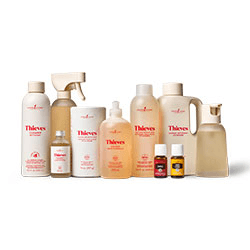I can’t even tell you how good it feels to finally clean my home without worrying about what’s in the bottle. For years, I used to read every label, trying to figure out which ingredients were safe and which weren’t — and honestly, it got exhausting.
Now, I’ve made it simple. Everything I need — from my all-purpose cleaner to laundry soap, dish soap, and even hand wash — comes from one trusted place: Thieves.
The Thieves Home Kit is my favorite way to start. It includes everything you need to swap out the toxic stuff and create a safe, fresh, low-tox home. Every product is infused with pure essential oils (like clove, cinnamon, lemon, eucalyptus, and rosemary) and smells like a cozy, clean kitchen after baking cookies — without the fake fragrance headaches.
I love that I don’t have to question what I’m bringing into my home. These products work amazing, and I know they’re safe for me, my family, and even the air we breathe.

Thieves Home Starter Bundle, includes:
🌿 What’s inside:
- 🧴 Thieves® Household Cleaner (426 ml) – one bottle makes up to 25 DIY cleaners!
- 🫧 Thieves® Foaming Hand Soap Concentrate (60 ml) + Glass Foaming Dispenser – gentle on skin, tough on dirt.
- 🧽 Multipurpose Glass Spray Bottle – mix your own all-purpose cleaner.
- 🧺 Thieves® Laundry Soap (946 ml) – naturally cleans without synthetic fragrance.
- 🍋 Thieves® Fruit & Veggie Soak (473 ml) – removes residues safely.
- 🍽️ Thieves® Dish Soap (355 ml) – powerful, plant-based grease fighter.
- 🧂 Thieves® Kitchen & Bath Scrub (392 g) – mineral-based sparkle for sinks and tubs.
- 💧 Thieves® essential oil blend (15 ml) – your immune-boosting, cleansing hero.
- 🍋 Lemon essential oil (15 ml) – the perfect bright, fresh scent for cleaning or diffusing.

One thing I love about natural wellness is how simple it can be.
And one of the easiest, most comforting winter remedies is honey infused with essential oils — paired with a few diffuser blends and gentle lifestyle support.
Why Essential Oils + Honey Work So Well Together
Honey is naturally soothing for the throat and chest, and when you pair it with the right essential oils, you create a warm, supportive mixture that can help with:
- throat comfort
- easier breathing
- winter immune support
- calming the body
- emotional well-being
- more energy when you feel worn down
And it only takes a drop to make a difference.
Vitality™ / Plus Line Oils — What You Need to Know
Young Living created the Vitality™ Line (or Plus Line in some countries) so you can easily tell which oils are labeled for internal use.
Here’s the part most people don’t know: The oil inside is the exact same as the regular bottle.
Same quality. Same purity. Same plant.
The only difference is the label — so you know how to use it safely.
Same quality. Same purity. Same plant.
The only difference is the label — so you know how to use it safely.
Use Vitality/Plus oils for:
✔ honey mixtures
✔ warm water or tea
✔ cooking & baking
✔ smoothies, dressings, soups
✔ daily wellness support
✔ honey mixtures
✔ warm water or tea
✔ cooking & baking
✔ smoothies, dressings, soups
✔ daily wellness support
Whenever you see a white label (Vitality) or Plus Line, you know it's approved for internal use.
Safety First: How to Use These Oils Correctly
A little goes a long way!
- Use very small amounts (often just a toothpick swirl when use in cooking).
- Always mix oils into honey first, then add warm (not hot) water if you wish.
- Avoid adding oils directly to hot water — it can irritate the throat.
Best Essential Oils for Cold & Cough Season
Here are my favorite gentle, common oils that support the body during winter:
Lemon: Freshen the throat, support, support immunity, helps break up mucus.
Orange: Uplifting and comforting when you’re tired or run down.
Ginger: Naturally warming; great for respiratory and digestive support.
Cinnamon Bark: A powerful antioxidant with deep winter support.
Peppermint: Opens the airways and clears the sinuses.
Spearmint: Gentler than peppermint — great for soothing the throat.
Oregano: Very strong seasonal support. Use sparingly!
Thyme: Traditionally used for cough, congestion, and chest comfort.
Frankincense: Supports deep breathing and calms the body.
Lavender: Perfect for nighttime comfort and relaxation.
My Favorite Honey Infusion Recipes
1. Throat Soother Honey
- 1 tsp raw honey
- Lemon
- Ginger
Helps calm scratchiness and supports throat comfort.
2. Winter Immunity Honey
- 1 tsp raw honey
- Oregano
- Thyme
- Optional: tiny Cinnamon swirl
A strong seasonal support blend — use once daily when needed.
3. Open Airways Honey
- 1 tsp raw honey
- Peppermint
- Frankincense
Helps with stuffiness, sinus pressure, and easier breathing.
4. Cozy Cough Relief Honey
- 1 tsp raw honey
- Orange
- Cinnamon
A comforting blend that tastes amazing on cold days.
5. Nighttime Calm Honey
- 1 tsp raw honey
- Lavender
- Lemon
Soothes the throat and relaxes the body before bed.
How to Use These Honey Remedies
Daily: Take 1 teaspoon or more during the day for general support.
If you’re coughing or congested, you can also add the “Open Airways Honey” to warm water and sip slowly.
Before bed, choose the Lavender or Frankincense blends for calming support and easier breathing at night.
The ratio is 1:1, one teaspoon of honey to 1 drop of oil. If you feel that is too strong for you, you can add more honey.
Diffuser Blends for Cold & Cough Season
Clear Breathing
- 2 drops Peppermint
- 2 drops Lemon
- 1 drop Frankincense
Immune Support
- 2 drops Lemon
- 2 drops Oregano
- 1 drop Cinnamon
Nighttime Comfort
- 3 drops Lavender
- 2 drops Frankincense
These blends help open the airways, soothe the mind, and support restful sleep — especially when you’re not feeling your best.
Staying well during winter doesn’t have to be complicated.
A few drops of essential oils, a spoonful of honey, warm drinks, rest, and gentle movement can make a world of difference.
A few drops of essential oils, a spoonful of honey, warm drinks, rest, and gentle movement can make a world of difference.
Neli Dume
Aromatherapist • Wellness Coach
@neli_dume | nelidume.com
References:
Fischer, R., et al. “Anti-inflammatory and antioxidative effects of lemon essential oil.” Journal of Food Science & Nutrition, 2018.
U.S. National Library of Medicine. “Limonene: therapeutic properties and antimicrobial potential.” NIH.gov
Lakhan, S. E., et al. “The effectiveness of ginger for respiratory and inflammatory support.” Complementary Therapies in Medicine, 2015.
- NIH: “Zingiber officinale (Ginger) — bioactive components and therapeutic use.”Rao, P. V., Gan, S. H. “Cinnamon: A Multifaceted Medicinal Plant.” Evidence-Based Complementary and Alternative Medicine, 2014.NIH: “Cinnamaldehyde and its antimicrobial activity.”Eccles, R. “Mechanisms of the menthol-induced sensation of nasal decongestion.” The Journal of Pharmacy and Pharmacology, 1994.Meamarbashi, A. “Menthol and respiratory function.” Journal of Comparative Physiology, 2013.
- Leyva-López, N., et al. “Oregano essential oil: antimicrobial, antioxidant and anti-inflammatory properties.” Molecules, 2019.
- NIH: “Carvacrol: biological activities and therapeutic potential.”
- Sadlon, A. E., Lamson, D. W. “Immune-modifying and antimicrobial effects of thyme extracts.” Alternative Medicine Review, 2010.
- NIH: “Thymol — therapeutic and antimicrobial action.”Moussaieff, A., Mechoulam, R. “Boswellia resin: from traditional use to scientific validation.” Journal of Pharmacology & Therapeutics, 2009.NIH: “Boswellic acids and respiratory health.”
- Koulivand, P. H., et al. “Lavender and the nervous system.” Evidence-Based Complementary and Alternative Medicine, 2013.
- NIH: “Lavandula angustifolia and relaxation response.”
- Oduwole, O., et al. “Honey for acute cough in children.” Cochrane Database of Systematic Reviews, 2018.
- Paul, I. M., et al. “Effect of honey as a cough suppressant.” Archives of Pediatrics & Adolescent Medicine, 2007.
- U.S. National Institute of Health: “Essential oils — mechanisms of action and therapeutic potential.”

If there’s one thing I’ve learned after living through my own shifts — it’s this:
Our lifestyle becomes either our biggest healer… or our biggest problem.
And most of the time, it’s not the big things that change our health.
It’s the tiny, daily habits we think “don’t matter.”
It’s the tiny, daily habits we think “don’t matter.”
But after 40, everything starts to matter more:
- Your sleep
- Your stress
- Your food
- Your movement
- Your environment
- Your home products
- Your mindset
These little things start adding up — in your energy, in your weight, in your mood, in your hormones, and even in how you age.
The good news?
You’re not powerless.
In fact, you have far more control than you think.
Let’s break it down gently and simply — the way I talk to my clients.
1. Your Air Quality Affects Everything
We spend more than 90% of our time indoors, and indoor air can be more polluted than outside — especially from cleaners, candles, sprays, and laundry products.
For midlife women, this matters even more: chemical fragrances can disrupt hormones, irritate the lungs, and increase inflammation.
A few simple swaps can change how your body feels:
- open your windows daily
- diffuse essential oils instead of spraying fragrance
- switch to low-tox cleaners (your body will feel the difference)
- choose natural laundry products
A cleaner home = a calmer immune system.
2. Time Outside Is Not Optional — It’s Medicine
Fresh air + sunlight is the most underrated hormone therapy.
Even 10–15 minutes a day can:
- lower stress
- support Vitamin D
- balance circadian rhythm
- improve mood
- reduce inflammation
And if you can walk? Even better.
Your lymphatic system (your detox system) activates when you move.
You literally “flush out” stress and toxins.
Your lymphatic system (your detox system) activates when you move.
You literally “flush out” stress and toxins.
3. Stress Is the Biggest Hormone Disruptor After 40
No cream or supplement can fix what chronic stress keeps breaking.
After 40, cortisol becomes louder:
- more belly fat
- more inflammation
- worse sleep
- cravings
- anxiety
- irritability
The solution isn’t complicated:
- deep breathing
- essential oils
- boundaries
- prayer
- slowing down
- daily routines that calm your body
Small resets throughout the day do more than one big vacation ever could.
4. Sleep Is Your Body’s Repair Mode
If you wake up tired, wired at night, or crashing in the afternoon… your hormones are asking for help.
Improve sleep with:
- magnesium
- early winddown
- darker room
- less phone at night
- nighttime oils (Peace & Calming, Lavender, Cedarwood)
Your immune system literally restores itself while you sleep.
5. What You Eat Becomes How You Feel
You don’t need a diet — you need nourishment.
Women 40+ need more:
- protein
- minerals
- whole foods
- hydration
- fiber
And less:
- sugar
- processed foods
- endocrine disruptors
- alcohol
- emotional eating
What you eat either fuels healing or fuels inflammation.
6. Movement Is Medicine — Not Punishment
You don’t need long, intense workouts.
You just need consistency.
You just need consistency.
Daily movement lowers stress, balances hormones, supports blood sugar, and strengthens your metabolism.
Try:
- 10-minute walk after meals
- gentle morning mobility
- 15 pushups to wake up your body
- strength training 2–3× per week
Movement should work with your life, not against it.
The Truth? You Are Not Broken. You Are Overloaded.
Your body isn’t failing.
It’s communicating.
It’s communicating.
And once you clean up your air, support your hormones, nourish your body, move daily, and reduce stress — you’ll be amazed at how quickly things change.
Your lifestyle is your greatest tool for healing.
And you get to choose which direction it goes.
And you get to choose which direction it goes.
📚 References
- Environmental Protection Agency (EPA). "Indoor Air Quality: Basic Information."
- Harvard T.H. Chan School of Public Health. “The Effects of Stress on Your Body.”
- National Sleep Foundation. “Sleep and Immune Function.”
- Journal of Clinical Endocrinology & Metabolism. Studies on cortisol and metabolic dysfunction in midlife women.
- American Heart Association. “Benefits of Walking for Heart and Metabolic Health.”
- National Institutes of Health (NIH). “Vitamin D and Immune Function.”
- North American Menopause Society. Research on hormone shifts and lifestyle interventions for women 40+.

3 Things I Do Every Morning to Keep My Energy High After 40
I’ve been in the wellness world my whole life.
I graduated in Physical Education & Sport, so I’ve always understood movement, energy, and routine. I knew what worked for my body — and for years, that kept me feeling vibrant and strong.
I graduated in Physical Education & Sport, so I’ve always understood movement, energy, and routine. I knew what worked for my body — and for years, that kept me feeling vibrant and strong.
But sometimes, life gets loud.
I’d skip the habits I knew were good for me… and I felt the difference immediately: tired in the morning, foggy in my mind, rushed, reactive — not myself.
I’d skip the habits I knew were good for me… and I felt the difference immediately: tired in the morning, foggy in my mind, rushed, reactive — not myself.
After 40, that contrast became impossible to ignore.
So I returned to the simple, grounding habits that always supported me. Gentle things. Powerful things. Consistent things.
So I returned to the simple, grounding habits that always supported me. Gentle things. Powerful things. Consistent things.
And honestly?
These three morning rituals changed everything for my energy, my mood, and how I show up every single day.
These three morning rituals changed everything for my energy, my mood, and how I show up every single day.
If you’ve been feeling tired, inflamed, foggy, or stuck in survival mode… this is exactly where I’d start.
✅ 1. I Hydrate With Minerals (Before Coffee!)
The FIRST thing I do is hydrate — and not with plain water.
After 40, cortisol naturally rises in the morning. We also begin to lose minerals faster, which impacts energy, digestion, and mental clarity.
Adding minerals first thing helps regulate your stress response.
Adding minerals first thing helps regulate your stress response.
My drink:
- Warm water
- A pinch of mineral salt or electrolytes
- 1 drop of Lemon Vitality or fresh lemon
Why this works (science-backed):
✅ Mineral hydration supports adrenal function
✅ Warm water stimulates digestion
✅ Lemon helps the liver start detox pathways
✅ Proper hydration increases energy and brain function
✅ Mineral hydration supports adrenal function
✅ Warm water stimulates digestion
✅ Lemon helps the liver start detox pathways
✅ Proper hydration increases energy and brain function
✅ 2. I Move My Body — Gently, Purposefully, and With Push-Ups
I don’t do intense workouts first thing in the morning.
I do activation, not exhaustion.
I do activation, not exhaustion.
Here’s my exact routine:
✅ 3–5 minutes of mobility:
- Hip circles
- Shoulder rolls
- Spine twists
✅ 8–10 bodyweight squats
✅ 15 morning push-ups
These wake up your upper body, activate your core, improve circulation, and fire up your nervous system.
And the goal isn’t perfection — it’s activation.
The push-ups are a beautiful midlife-friendly strength habit because they stimulate:
The push-ups are a beautiful midlife-friendly strength habit because they stimulate:
- Chest
- Shoulders
- Triceps
- Core
- Back muscles
All in under 30 seconds.
✅ 1–3 minutes of gentle walking
Outside if the weather allows, or in the kitchen while the water heats.
Why movement works (especially after 40):
✅ Improves insulin sensitivity
✅ Lowers morning cortisol
✅ Boosts metabolism
✅ Reduces stiffness
✅ Wakes up the brain through oxygen flow
✅ Improves insulin sensitivity
✅ Lowers morning cortisol
✅ Boosts metabolism
✅ Reduces stiffness
✅ Wakes up the brain through oxygen flow
✅ 3. I Use Essential Oils to Set My Mood & Focus
Your sense of smell sends messages straight to the brain’s emotional center — the limbic system — in seconds.
This is powerful for women after 40, especially with fluctuating hormones.
This is powerful for women after 40, especially with fluctuating hormones.
My morning diffuser blends depend on what I need:
For energy & clarity:
- Peppermint
- Lemon
- Rosemary
For calm focus:
- Frankincense
- Lavender
- Stress Away
For mood & confidence:
- Orange
- Valor
- Bergamot
Sometimes I diffuse.
Sometimes I apply.
Sometimes I inhale from my palms.
Sometimes I apply.
Sometimes I inhale from my palms.
One minute — and my nervous system resets.
✅ Final Thoughts
I’m not interested in complicated morning routines.
I’m interested in habits that support a woman’s body after 40 — naturally, gently, consistently.
I’m interested in habits that support a woman’s body after 40 — naturally, gently, consistently.
These three rituals (minerals, movement, and oils) are my foundation.
They keep me steady, strong, and energized, even on busy days.
They keep me steady, strong, and energized, even on busy days.
References:
- L. P. Speich, Electrolytes and hydration in adult women, Journal of Nutrition, 2019.
- Harvard Health Publishing: “Cortisol and morning energy cycles.”
- Essential Oils Desk Reference, 7th Edition
- Moss M., Essential oils and cognitive performance, International Journal of Neuroscience
- Young Living clinical references on aromatherapy & emotional support
- American College of Sports Medicine (ACSM): Morning activity and cortisol regulation
- Metabolism Journal, 2021: Light morning movement improves insulin sensitivity
- Debra Atkinson, Flipping 50®: Strength in menopause


 Every January — or anytime life feels heavy — the same thing happens.
Every January — or anytime life feels heavy — the same thing happens.